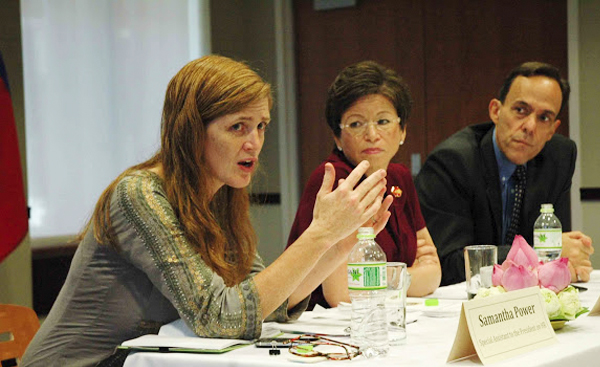Samantha Power Testifies On War in Syria Before Senate Committee

At her confirmation hearing before the Senate Committee on Foreign Relations, U.S. Ambassador to the United Nations Nominee, Samantha Power, made evident her stance on Syria. As an ardent proponent of interventionist policy and a fervent advocate of human rights, Power opined that the United Nation’s inaction in Syria is a “disgrace that history will judge harshly” and that multilateral action must be a priority.
She claimed that Syrian President Bashar al-Assad’s regime has “written a new playbook for brutality,” and that if confirmed by the Senate she will “be a blunt, outspoken champion of American values and of human rights."
Moreover, she asserted that to bring Russia on board with the United State’s views on Syria will be difficult, and, in the case that the Security Council decides it prefers apathy to vitality, the U.S. should be free to take unilateral action if deemed necessary by our national interests, chiefly national security.
At the same time, however, Power made sure to not come off as impractical and bellicose. She affirmed that though America’s “goodwill knows no bounds,” “we are not the world’s policeman” and are indeed strained by “needs at home” (This statement also helped denounce her controversial claim, from a 2002 interview, that we may need to police the Mid-East).
Through her testimony, she emphasized three primary concerns about Syria:
- It is one of the most pressing international issues at hand,
- It no longer constitutes as a crisis the United Nations can keep quiet about,
- It is a human rights issue, implicating a moral imperative that calls us to take action.
However, her statements tell us, a colossal UN peacekeeping force sent mostly under U.S. funding is not acceptable either because “our resources are finite.”
Essentially, Power is a moderate in terms of her standpoint on Syria. She doesn’t believe the country should be burdened by a multi-trillion dollar war and recovery effort, resourced by the U.S.
But, she also doesn’t believe that the United Nations should continue to be hindered by Russian vetoes. She believes that ridding Syria of Assad through multilateral action is the best approach and that deploying U.S. ground troops or bombing Assad’s strongholds on day one would be imprudent.
Samantha Power has made herself many friends from both sides of the aisle. Her testimony reflected her commitment to human rights, a subject that she has written a Pulitzer Prize winning book on, and it further established her as someone who is plainspoken yet sensible.
Her confirmation is increasingly likely given her considerable support from influential Senators including Bob Menendez and John McCain. Likewise, Americans can expect a renewed push for UN intervention in Syria. One that will shun drastic, warhawk-like measures but will instead actively seek to involve Security Council countries such as Russia and China.




